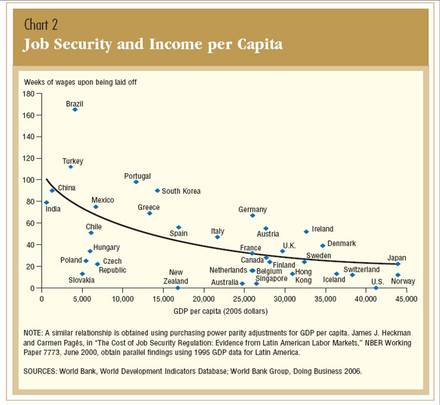
Source of graph: Siems, Thomas F. “Beyond the Outsourcing Angst: Making America More Productive.” Economic Letter 1, no. 2 (2006): 1-8.
Although the United States media focus on job loss and insecurity, the secular trend for the last 25 years has been one of greater number of jobs, lower levels of unemployment, and higher levels of productivity.
Month: April 2006
World Bank Fights Fraud in Antipoverty Projects
The World Bank president, Paul D. Wolfowitz, laid out a broad strategy yesterday to help developing countries combat rampant corruption, as well as to halt fraud in antipoverty projects supported by billions of dollars in World Bank money.
In a speech in Jakarta, Indonesia, Mr. Wolfowitz described for the first time his plans to make fighting corruption a pervasive issue in the bank’s operations. The new efforts will range from intensified monitoring of projects in the field to an increased focus on reforming institutions that can hold governments accountable.
Mr. Wolfowitz also seems to be trying to change the culture of the bank. In remarks after the speech, he said he wanted bank managers to understand that they would be rewarded “as much for saying no to a bad loan as for getting a good one out the door.”
For the full story, see:
CELIA W. DUGGER. “World Bank Chief Outlines a War on Fraud.” The New York Times (Weds., April 12, 2006): A7.
Successful Society Requires Moral Courage to Sanction Others
Sociologists have long known that communes and other cooperative groups usually collapse into bickering and disband if they do not have clear methods of punishing members who become selfish or exploitative.
Now an experiment by a team of German economists has found one reason punishment is so important: Groups that allow it can be more profitable than those that do not.
. . .
”The bottom line of the paper is that when you have people with shared standards, and some who have the moral courage to sanction others, informally, then this kind of society manages very successfully,” said the study’s senior author, Bettina Rockenbach, who was joined in the research by Bernd Irlenbusch, now at the London School of Economics, and Ozgur Gurek.
Switching groups frequently prompted remarkable behavioral changes in the students. Many of those who had been free riders in the laissez-faire group eagerly began penalizing other selfish players upon switching. Dr. Rockenbach compares these people to heavy smokers who are insistent on their right to light up, until they quit. ”Then they become the most militant of the antismokers,” she said.
Being exploited appeared to cause deep frustration and anger in most students, she said.
For the full story, see:
BENEDICT CAREY. “Study Links Punishment To an Ability To Profit.” The New York Times (Friday, April 7, 2006): A22.
Becker on Goals of Economics: Understand the World, and Improve It
 Gary Becker at April 7, 2006 tribute dinner. Source of image: online press release cited below.
Gary Becker at April 7, 2006 tribute dinner. Source of image: online press release cited below.
Gary Becker has made enormous contributions to economic theory, most notably in convincing the profession of the importance of human capital and the family. A new center has been established at the University of Chicago in Gary Becker’s honor.
Becker’s brief remarks concluded the evening. Economics will change over time, but one constant—whatever the tools or techniques—is the goal of economics, he said. “It is judged ultimately by how well it helps us understand the world, and how well we can help improve it.”
For the full story, see:
J.K. Rowling on What Matters
Writing on her Web site after reading a magazine featuring photographs of a thin woman who was ”either seriously ill or suffering from an eating disorder,” Ms. Rowling expressed concern that her daughters, Jessica, 12, and Mackenzie, 1, might become overly conscious about their weight, Agence France-Presse reported. ”I don’t want them to be empty-headed, self-obsessed, emaciated clones,” she said. ”I’d rather they were independent, interesting, idealistic, kind, opinionated, funny — a thousand things, before ‘thin.’ ”
LAWRENCE VAN GELDER. “Arts, Briefly; J. K. Rowling Speaks Out.” The New York Times (Friday, April 7, 2006): B5.
Jhontelle Johnson on public schools: “you can’t make me go”

Fransoir William. Source of image: http://www.nytimes.com/2006/04/06/education/06voucher.html?pagewanted=1&ei=5094&en=d2a47406ed1f9127&hp&ex=1144382400&partner=homepage
(p. A1) WASHINGTON, April 5 – As a student at Shaw Junior High School here, Amie Fuwa strained to shut out the distractions of friends cutting up. She struggled through math, and used photocopies or the library when textbooks were scarce.
Now Amie, 14, a child of immigrants from Nigeria and the Dominican Republic, attends Archbishop Carroll High School, a Catholic school near a verdant hill of churches nicknamed the Little Vatican. When algebra confounds Amie, her teacher stays with her after school to help, and a mentor keeps her on course.
”It’s a lot of people behind my back now,” Amie said.
Before, she said, she ”felt like it didn’t really matter to different people I know, like my teachers, if I failed.”
Amie is one of about 1,700 low-income, mostly minority students in Washington who at taxpayer expense are attending 58 private and parochial schools through the nation’s first federal voucher program, now in its second year.
Last year, parents appeared lukewarm toward the program, which was put in place by Congressional Republicans as a five-year pilot program, But this year, it is attracting more participation, illustrating how school-choice programs are winning over minority parents, traditionally a Democratic constituency.
Washington’s African-American mayor, Anthony A. Williams, joined Republicans in supporting the program, prompted in part by a concession from Congress that pumped more money into public and charter schools. In doing so, Mr. Williams ig- (p. A16) nored the ire of fellow Democrats, labor unions and advocates of public schools.
. . .
Like many other voucher students, Breanna Walton, 8, rises before dawn for the long bus ride from Northeast Washington, ”amongst the crime and drugs and all that,” in the words of her mother, April Cole Walton, to Rock Creek International, near Georgetown University. There, she learns Spanish with the children of lawyers and diplomats.
Ms. Walton said that her neighborhood school ”has broken down,” and that she would have done just about anything to keep Breanna from going there. ”Every child here should be able to say I’m going to set my sights high,” she said. ”I refuse to let my child be cheated.”
Patricia William, a single mother, said that at first she liked her son Fransoir’s public school, John Quincy Adams Elementary School, a tall sprawling building in the Adams Morgan neighborhood. Teachers seemed good, but overwhelmed. It was other parents, not teachers, Ms. William said, who told her that Fransoir was hyperactive. ”I was not getting quality information from them on time,” she said. ”For some reason, it was not working.”
Fransoir is one of 62 students with vouchers attending Sacred Heart Elementary, a Catholic school of 210 students, where he learns prayers along with five-digit multiplication and long division. He takes medication for his hyperactivity. Last year, he teamed up with another child to research the sinking of the Titanic. This year, he is interested in reptiles. Ms. William said her son today has nothing in common with the boy who once lay on the floor, turning in circles like a clock wound too tight. Now she is learning from him, about more than just math or reading or a sinking ship.
”All the effort he’s making every night makes me want to sit with him and study,” said Ms. William, a high-school dropout. ”I’m learning academically, but also about making an effort.”
. . .
. . . the pressure of competition is inescapable. In one sixth-grade classroom, two of six students said they would probably go to charter schools next year, unless Adams could get its seventh grade started.
”I’ll probably go to Washington Latin,” said Jhontelle Johnson, setting her sights on a new charter school opening in August. If not, she said, ”I’d probably be home-schooled.”
A teacher’s aide, Sheonna Griffin, looked askance. ”You don’t like public schools?” she asked the child.
Jhontelle turned back, her young eyes flashing. ”You can’t make me go,” she said.
For the full story, see:
DIANA JEAN SCHEMO. “Federal Program on Vouchers Draws Strong Minority Support.” The New York Times (Thurs., April 6, 2006): A1 & A16.

Fransoir William. Source of image: http://www.nytimes.com/2006/04/06/education/06voucher.html?pagewanted=2&ei=5094&en=d2a47406ed1f9127&hp&ex=1144382400&partner=homepage
Labor Market Flexibility Increases Employment and Prosperity
“France is definitely behind,” says William Keylor, professor of International Relations and history at Boston University. “If France were to create a more-flexible labor market it would eventually increase productivity and prosperity, but the short-term transition would be difficult and people just aren’t thinking long term.”
There have been labor changes across continental Europe recently. Denmark’s measures to liberalize hiring and firing have helped the country cut its unemployment rate in half from about 10% in the early 1990s to under 5%. Spain, too, has introduced short-term employment contracts which have helped cut its unemployment rate by more than half from 20% a decade ago.
But elsewhere, attempts at change have met with staunch opposition, often resulting in watered-down measures. Italy passed changes to its labor laws in 2004, introducing an extension of temporary-work contracts that were introduced in 1997 and were credited with helping cut Italy’s overall unemployment rate to 7.1% from 12% when the contracts began. Yet many economists say Italy, which recorded zero growth last year, hasn’t gone far enough.
In Germany, where unemployment stands at 11%, a coalition government headed by conservative leader Angela Merkel has promised to reduce unemployment by introducing similar measures to those hotly debated in France. The government had to settle on compromise measures that can extend a current probation period for workers to 24 months, from the current six. But companies don’t have the right to terminate contracts within those two years without giving just cause. Other, more difficult, provisions, are still on hold.
The new measures that will be introduced in Parliament as early as today are targeted at “disadvantaged” youths, which refer to people between 18 and 25 who have left school without any qualifications and who are unemployed. The provisions include increasing financial incentives to employers to hire people under 26 who face the most difficulties.
It would apply to some 160,000 young people currently hired under government-subsidized job contracts, according to an interview with Employment Minister Jean-Louis Borloo in an interview with Le Monde newspaper. The cost to the government would be around €150 million ($180 million) in the second half of 2006, Mr. Borloo was quoted as saying.
But economists said the change of tack was a bad signal. “The real problem is that the results obtained by opponents of the new law…show that it is very difficult to introduce reforms in France,” Dominique Barbet, economist at BNP Paribas, wrote in a research note. “This will give opponents of reform confidence for future actions.”
For the full story, see:
ALESSANDRA GALLONI. “Bowing to Protesters, Chirac Abandons Youth-Labor Law; Reversal Highlights Europe’s Difficulties With Painful Reforms.” The Wall Street Journal (Tues., April 11, 2006): A3 & A10.
(Note: the title and version of the article quoted here are from the online version. The title and content of the version in the printed paper was a little different in a couple of places.)
Wage Security Inversely Related to GDP Per Capita

Source of graph: Siems, Thomas F. “Beyond the Outsourcing Angst: Making America More Productive.” Economic Letter 1, no. 2 (2006): 1-8.
Schumpeter’s theory of creative destruction implies that more flexible labor markets will result in greater productivity per worker. The above recently published evidence, supports the implication.
Studies Show Economic Freedom Boosts Economic Growth
A trio of European economists have just published a meta-analysis on the effects of economic freedom (EF) on economic growth. After many pages, here is their bottom-line conclusion:
(p. 182) Most studies reviewed in this paper have serious drawbacks, including lacking senstitivity analysis and poor specifications of the growth model used. However, studies that have applied some kind of sensitivity analysis and sensible specfications generally find support for a positive relationship between changes in EF and growth. This suggests that liberalization will indeed boost economic growth.
For the full article, see:
De Haan, Jakob, Susanna Lundström, and Jan-Egbert Sturm. “Market-Oriented Institutions and Policies and Economic Growth: A Critical Survey.” Journal of Economic Surveys 20, no. 2 (2006): 157-91.
Private Enterprise “computer-chip makers have better hand-cleaning standards than most hospitals”
With rising alarm over hospital infections, which cause 90,000 deaths annually, a growing number of hospitals are adopting aggressive hand-hygiene surveillance and monitoring programs, and in some cases imposing penalties for doctors, nurses, and other health-care workers who don’t follow the rules.
. . .
Despite strict guidelines issued by the CDC to stop the spread of bacteria on contaminated hands, and wide adoption of alcohol-based hand-rub dispensers in patient rooms and hospital corridors to make it easier for harried health-care workers to disinfect between patients, compliance rates remain mired at 40% to 50% nationwide, studies show.
The IHI program recommends a far more activist approach that holds hospital administrators and staffers accountable for failure.
“It no longer is tolerable to accept noncompliance rates of more than 50% when we are dealing with critically ill patients,” says Don Goldmann, a senior vice president of IHI and a professor of pediatrics at Harvard Medical School, who notes that computer-chip makers have better hand-cleaning standards than most hospitals. While the IHI program emphasizes education and positive feedback, “repeated violations in health-care, or any industry, need to have consequences,” Dr. Goldmann says.
For the full story, see:
LAURA LANDRO. “THE INFORMED PATIENT; Hospitals Get Aggressive About Hand Washing; Staff Surveillance Programs, New Penalties Aim to Boost Sagging Compliance Rates.” The Wall Street Journal (Weds., April 5, 2006): D3.
